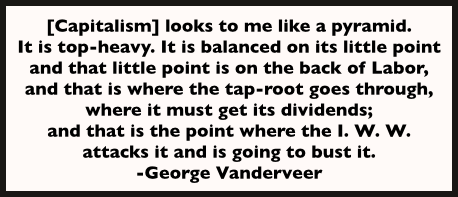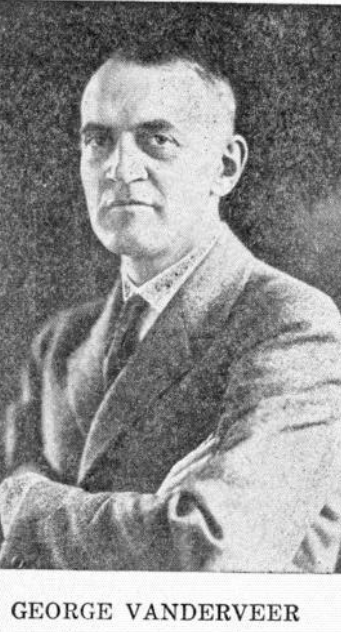
~~~~~~~~~~~~~~~~~~~~~~~~~~~~~~~~~~~~~~~~~~~~
Hellraisers Journal, Thursday July 11, 1918
Chicago, Illinois – I. W. W. Trial, Third Week of June
From The Ohio Socialist of July 9, 1918:
THE I. W. W. TRIAL
[Part I]By Harrison George
The third week of June opened with the promise of a speedy passing as the prosecution had announced a purpose to close their case by Wednesday, the 19th.
With the closing of the prosecution’s side in view, the interest became heightened as all looked for “surprises” and expected some tremendous broadsides at the finish. It was a real disappointment when nothing of the kind occurred, when no climax came and everything merely fizzled out, like a bad firecracker.
Comparatively few witnesses appeared, the most important ones taking the stand Monday, the 17th. To illustrate what was left of them after Vanderveer’s grilling, let us pick at random from the record, let us examine the testimony of Elton Watkins, special agent of the Department of Justice, stationed at Portland, Oregon, and sent from there last July to the lumber strike district at Astoria, Oregon.
On direct examination Watkins told of his Sherlockian methods with some pride. He didn’t go to Astoria to settle the strike, to ascertain the cause or to confer with both sides. He did talk with the bosses, he did ask the postmaster who the I. W. W. secretary was, and he did spy upon the strikers’ meetings through a crack in a partition to hear what A. E. Soper, then secretary, now a defendant, said in speeches.
Vanderveer: Q.-Did you make any effort to gain access to those meetings by the regular door provided for that purpose?
[Agent Watkins] A.-No, no.
Q.-You wanted to be sure that nobody would be warned of your presence and thereby be guarded in their talks? You wanted to hear what they said among themselves, didn’t you?
A.-Indeed I did.
Q.-Didn’t Mr. Soper say that violence was a sign of weakness? When people became industrially impotent they became violent?
A.-I don’t remember, but he did say that was the method of the A. F. of L.
Q.-You did not hear anything about the war, did you?
A.-No, I don’t recall anything.
Q.-Nor anything about conscription?
A.-No.
Q.-Nor anything about conscription?
A.-No.
Q.-You say Mr. Soper explained direct action. Do you remember his explanation of it?
A.-The way I remember-direct action was in presenting their demands or grievances directly to the fellow who owned the place.
Q.-And if they could not adjust it, force it by strike?
A.-Yes.
Q.-Or by industrial methods?
A.-Yes.
Q.-Did Mr. Soper or anyone else at the meetings advocate the driving of spikes in logs or the breaking of saws?
A.-No, I never heard that.“That is all,” said Vanderveer.
The prosecution tried hard to make this “spikes in logs” theory stick, but to no avail. Two knives, broken from a rotary planer machine, were made much fuss over; Nebeker tenderly fondled them in ostentatious display, before the jurors as he examined a witness on “direct.” These planer knives were brought from a mill at Aloha, Washington, by the mill superintendent, Mr. Frank Milward, who knew the knives were broken but did NOT know what the cause was or who if anyone was responsible, yet, of course, testifying that it “must have been the I. W. W.”
Vanderveer-Did you ever see a spike knot (a natural growth) in spruce?
[Mr. Frank Milward] A.-Yes, considerable.
Q.-Did you ever see it break a planer knife?
A.-Yes.
Q.-Very often?
A.-Quite often.One might comment here how unfortunate it was that the I. W. W. did not exist in George Washington’s boyhood, else he might have responded to the question of who cut the cherry tree by saying: “Father, I cannot tell a lie-the I. W. W. did it.”
But Vanderveer was not through with Mr. Milward and, while the hundred defendants leaned forward in hushed expectancy the little lawyer with the fighting jaw launched an attack that carried the prosecution off its feet and caused Nebeker to go white and red by turns-uncovering in a few minutes the depravity of our opposers.
Vanderveer-You say you are the Superintendent of the Aloha Lumber Co.?
A.-I am, yes.
Q.-That is located between Aberdeen and Moclips, Washington?
A.-Yes.
Q.-Where were you on the 20th of May (1918)?
A.-Well, I could make you a pretty good guess.
Q.-You were at Aloha, Washington?
A.-That is the best of my knowledge.
Q.-How far do you say your plant is from the Joe Creek Shingle Co.?
A.-Two and a half miles, probably.
Q.-Do you know the foreman of the Joe Creek Co., Mr. Campbell?
A.-I know Mr. Campbell, yes, well.
Q.-I want to ask you whether, on the 20th of last month-your name is Frank, is it?
A.-Yes, sir.
Q.-Mr. Campbell came to you and told you that a certain man who had formerly been employed in their mill, had quit work there; that they wanted him to stay and he would not-just that much?
A.-I remember a conversation something of that kind.
Q.-And whether that man did not come to Aloha? Wasn’t he sent down there to get his pay ostensibly?
A.-I don’t know anything about that.
Q.-He came down there?
A.-I saw-
Q.-And you and some other gentlemen took him and locked him in a car from about 8 o’clock in the morning until about noon?
A.-Well, you wish then, probably to make me instrumental in that, other than just being a spectator.
Q.-Oh, I am trying to find out-were you there?
A.-I saw it transacted.
Q.-And then you and some soldiers took the man out about noon-tarred and feathered him, didn’t you?
A.-I saw it done.
Q.-You had nothing to do with it?
A.-Well, no, no more than being a spectator. I never laid hands on the man or put any tar on the man.
Q.-Did you say anything to the men to encourage them?
A.-I don’t know if I did in particular.
Q.-Did you say anything to discourage them?
A.-No.
Q.-What?
A.-I said I did nothing to discourage them.
Q.-Nothing to discourage them, although some of them were your employes?
A.-They were all.
Q.-Except the soldiers.
A.-The soldiers were also my employes.
Q.-The soldiers were also your employes! You didn’t order them to stop that?
A.-No, sir.
Q.-You thought he was an I. W. W., but was not, isn’t that a fact?
A.-How do you know I thought that?
Q.-Well, didn’t you?
A.-I think he probably was.
Q.-Is that the reason you tarred and feathered him?Nebeker-I object, if the court please, the witness has not said he tarred and feathered him.
Landis-Objection sustained.Vanderveer-Well, is that the reason you watched the others tar and feather him?
A.-Put that as one reason.
Q.-You approve of what that crowd did to that fellow, did you?
A.-Well, you claim I did.
Q.-Well, did you?
A.-I did not disapprove.
Q.-You believe in that way of handling things, don’t you?Witness (to the court)-Would I be compelled to answer a question of that nature?
Landis-Yes.Witness-Well, I don’t believe the man got anything he did not deserve.
Q.-Well, then, you believe that is all right?
A.-In that particular instance.
Q.-You made a nice, loyal citizen of that man, of course?Nebeker-I object, as not proper.
Landis-Objection overruled.Q.-You made a good, loyal citizen of that man?
A.-I don’t know anything about that man.
Q.-You made him dearly love the soldiers? You made him love the flag and everything, didn’t you?
A.-I don’t know what he loved.Nor was this the end of Milward’s discomfiture.
[Article to be continued…]
———-
~~~~~~~~~~~~~~~~~~~~~~
SOURCE
The Ohio Socialist
“Official Organ of the Socialist Party of Ohio”
(Cleveland, Ohio)
-July 9, 1918
https://www.marxists.org/history/usa/pubs/ohio-socialist/024-jul-09-1918.pdf
IMAGES
Quote Vanderveer re The Pyramid, Chg IWW Trial June 25, 1918
https://babel.hathitrust.org/cgi/pt?id=umn.31951d01368761a;view=2up;seq=68
George Vanderveer, Chaplin Centralia
https://www.iww.org/PDF/history/library/Chaplin/Centralia.pdf
See also:
The I.W.W. Trial
-Story of the Greatest Trial in Labor’s History
-by one of the Defendants
-by Harrison George
—-with introduction by A. S. Embree.
IWW, Chicago, 1919
https://catalog.hathitrust.org/Record/100663067
Chapter VI, page 52
https://babel.hathitrust.org/cgi/pt?id=umn.31951d01368761a;view=2up;seq=54
Note: First ad I can find for this book:
Butte Daily Bulletin -page 3
-Mar 5, 1919
https://www.newspapers.com/image/176048912/
The IWW in the Lumber Industry
by James Rowan
Lumber Workers Industrial Union #500
IWW, Seattle, 1920
https://www.iww.org/history/library/Rowan/lumberindustry
~~~~~~~~~~~~~~~~~~~~~~~~~~~~~~~~~~~~~~~~~~~~

